
MBTAAnalysis: A look inside the MBTA
0 Comments
/
The MBTA shuttles over a million passengers a day around Greater…
 https://pioneerinstitute.org/wp-content/uploads/CloseupClock-1.jpg
739
1244
Mary Connaughton
https://pioneerinstitute.org/wp-content/uploads/logo_440x96.png
Mary Connaughton2017-02-20 12:34:192017-02-21 09:47:58The Clock is Ticking…….
https://pioneerinstitute.org/wp-content/uploads/CloseupClock-1.jpg
739
1244
Mary Connaughton
https://pioneerinstitute.org/wp-content/uploads/logo_440x96.png
Mary Connaughton2017-02-20 12:34:192017-02-21 09:47:58The Clock is Ticking…….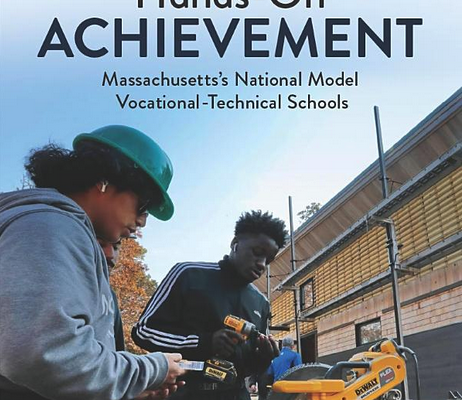
Webinar: Focusing on Massachusetts’ Model Vocational-Technical Schools
Pioneer Institute and First Things Magazine recently hosted an hour-long webinar examining the successes of vocational-technical schools, how education in the trades is faring nationwide, and the prospects for today’s high school graduates as they seek careers and additional training beyond the secondary level.

Two Stars in a Glowing Voc-Tech Education System
“A Tale of Two City Schools: Worcester Tech and Putnam Academy Become Models for Recovery” is a new white paper by Pioneer Institute that analyzes how Worcester Tech and Putnam Academy — schools with high numbers of low-income and special needs students — leapt from the bottom of Massachusetts voc-tech rankings to become leaders among local schools.

David Ferreira & Chris Sinacola on MA’s Nation-Leading Voc-Tech Schools
This week on “The Learning Curve," co-hosts Cara Candal and Gerard Robinson talk with Chris Sinacola and David Ferreira, co-editors of Pioneer’s new book, Hands-On Achievement: Massachusetts’s National Model Vocational-Technical Schools. They share information from their new book on the story of the Bay State’s nation-leading voc-tech schools, and how accountability tools from the state’s 1993 education reform law propelled their success.
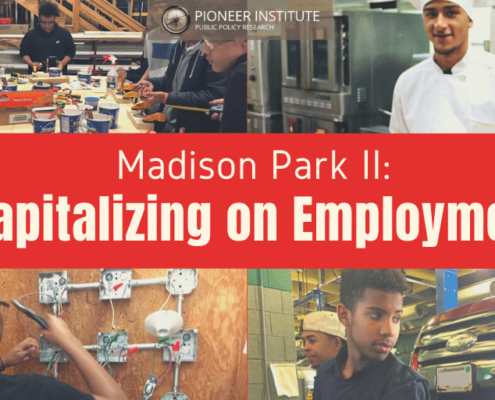
Madison Park II: Capitalizing on Employment Opportunity
This report reviews the co-operative education program at Boston’s Madison Park Technical Vocational High School, which places students in paid positions with local employers. The study finds that the program lags far behind other Massachusetts vocational-technical schools in terms of both placements and number of employer contacts. But with the school as a whole beginning to improve after years of turmoil, the co-op is also showing promising signs.
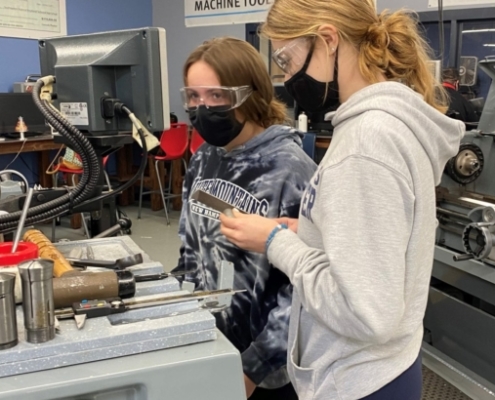
Voc-tech schools thriving despite pandemic strictures
HANDS-ON EDUCATION plays a critical role at Massachusetts regional vocational-technical high schools, where students alternate weekly between academics and shop classes. Given that reality, you’d think the schools would be particularly hard hit by the switch to hybrid models under which students are in a physical school building only half the time. But thanks to innovative approaches to coping with pandemic-related restrictions, voc-techs are successfully bucking statewide public-school enrollment trends.

Madison Park Technical Vocational High School Turnaround Update
Four years after it began to implement a turnaround plan, Boston’s Madison Park Technical Vocational High School is showing clear signs of progress, but its performance continues to lag behind that of other vocational-technical schools in Massachusetts, according to a new study published by Pioneer Institute.
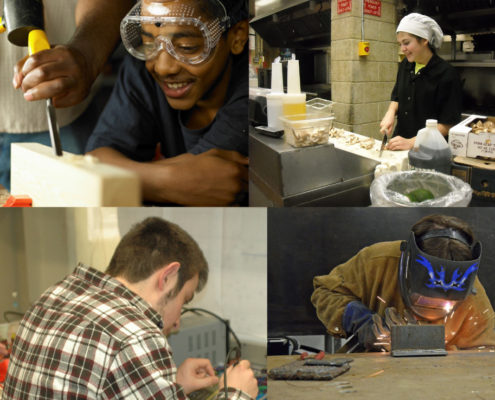
Don’t mess with success of voc-tech high schools
For more than 25 years, Massachusetts vocational-technical high schools have done everything state officials have asked of them. Instead of moving the goal posts by compelling them to switch to a lottery system, we should expand the schools.
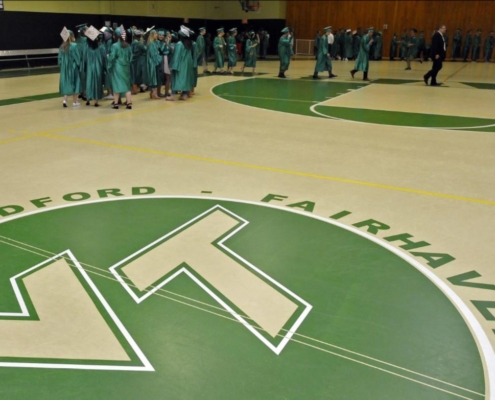
More students, employers need to benefit from voc-tech schools’ winning formula
This op-ed appeared in Commonwealth Magazine and New Bedford…
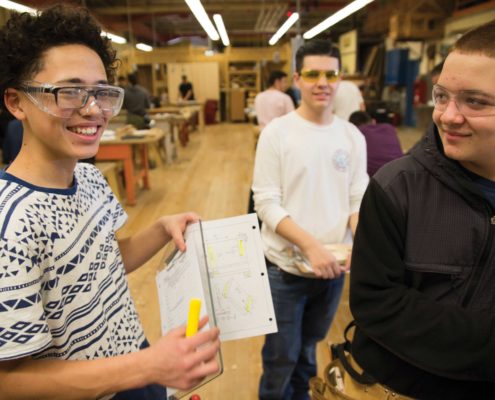
Op-ed: Time to lift up Boston’s voc-tech high school
Read this full op-ed in CommonWealth magazine.
By Tom Birmingham…

The Healing Hand: Modeling Catholic Medical Vocational-Technical Schooling
This study explores whether medical vocational-technical education could be a tool to help Boston-area Catholic schools address declining enrollment and also provide economically disadvantaged students with skills that are in high demand among employers.

Op-ed: Voc-tech schools are a Mass. success story
Read this entire op-ed online at CommonWealth Magazine, the…

Expanding Access to Vocational-Technical Education in Massachusetts
This paper explores why vocational education has become such a popular option in Massachusetts, and why 52 Bay State cities and towns do not have access to either district or regional career vocational technical programs. It also examines funding for vocational- technical education. While vocational-technical education is more expensive than traditional high school, it would cost the state less than ½% of the FY16 education budget to provide 5,000 more CVTE placements in Massachusetts.
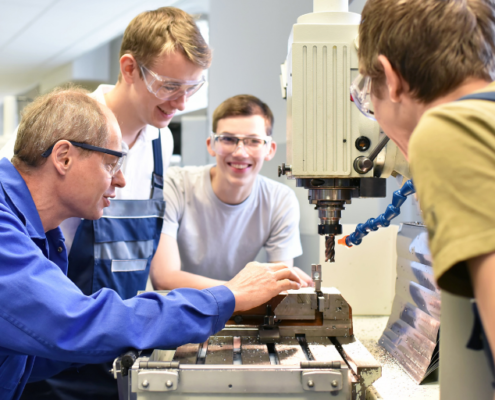
Filling the Skills Gap: Massachusetts Vocational-Technical Schools and Business Partnerships
Society is recognizing that in today’s economy, many graduates of four-year liberal arts colleges are looking for work, while students from career vocational technical schools are finding high-skill, high wage jobs. Why? Because they have marketable, industry-sanctioned competencies and employability skills.
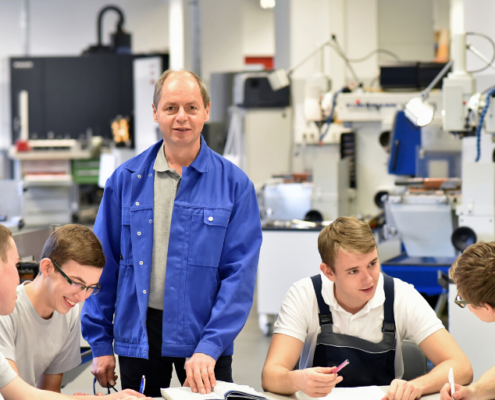
Hands-On Achievement: Why Massachusetts Vocational Technical Schools Have Low Dropout Rates
More than one million students drop out of high school in the United States each year, setting them on courses of lost income, diminished health, and increased odds of incarceration. Collectively, their decision costs the nation hundreds of billions of dollars in lost revenue, lower economic activity and increased need for social services.

Fall River Herald News: Mass. should explore proven approaches to dropout prevention
There are three proven ways to reduce dropout rates that address this problem: regional vocational-technical schools, digital learning, and a serious refocusing on academic learning.

A big test at Madison Park Vocational
http://boston.com/community/blogs/rock_the_schoolhouse/2012/06/a_big_test_at_madison_park_voc.html
In…

Pivotal role of vocational education
http://www.berkshireeagle.com/editorials/ci_20250784/pivotal-role-vocational-education
According…

Vocational-Technical Education in Massachusetts
Massachusetts, a pioneer in many ways, has always been at the forefront of vocational technical education. A century ago, the Smith Vocational and Agricultural High School opened in Northampton. Smith is still operating today, and is the forerunner to a mode of education that remains vitally important to the state’s workforce. Massachusetts’ Vocational-Technical Education (VTE) is a unique method of academic, career, and extracurricular activity that creates a comprehensive blend of opportunity and advancement.

